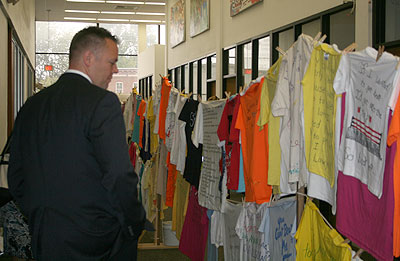

Please be aware that if you are a victim of domestic violence, your partner may be able to monitor your online activity.
If viewing this site is unsafe for you, please call Fearless! Hudson Valley at 845-862-5340.
Domestic Violence
The Port Jervis City Police Department is proud to partner with Fearless! Hudson Valley to provide immediate emergency assistance and compassionate and professional domestic violence intervention and advocacy services to victims of domestic violence.
Through our partnership with Fearless! Hudson Valley, we support the mission of Fearless! Hudson Valley to “eliminate all forms of domestic violence through education, outreach and provision of services to individuals and families affected by domestic abuse”. “Every home should be a Safe Home.”
If you are in immediate danger, call 911. If you are not in immediate danger and you wish to speak to a domestic violence advocate or a police officer about the options available to you, please call the Port Jervis City Police Department at 845-856-5101. You may also contact a representative of Fearless! Hudson Valley at the following 24-hour toll free (anonymous) Domestic Violence Hotline.
24-Hour Hotline: 845-562-5340 Business Phone: 845-562-5365
Together, we can make a difference and stop the cycle of domestic abuse and violence. “Every Home Should be a Safe Home”
What is Domestic Violence?
Domestic violence is a pattern of coercive behavior used to maintain power and control over an intimate partner.
Domestic violence has its roots in sexism and the historical oppression of women.
Intimate-partner violence occurs in families of all social, racial, economic, educational and religious backgrounds. It is present in towns, suburbs, rural areas and neighborhoods. While women with fewer economic resources may seek help more often or report domestic violence more frequently, it doesn’t mean that women in the upper and middle classes are less likely to be victimized. Economic advantages can improve a woman’s options and resources and facilitate access to readily-available private services–resulting in underreported violence.
Myths and Misperception versus Reality
–Myth: Alcohol and drug abuse cause intimate-partner violence.
Reality: Alcohol and drug abuse do not cause intimate-partner violence. In the presence of alcohol and drug abuse, violence may increase or become more severe, and existent violent behavior may intensify.
Sixty-five percent of intimate-partner violence cases DO NOT involve drugs or alcohol. Many batterers do not abuse alcohol or drugs, and many alcohol or drug abusers do not batter. Chemical dependency treatment will not cure battering; the two problems need to be addressed separately. The alcohol abuse rate for abused women is similar to that of the general female population, 7 to 14 percent. Moreover, a woman’s alcohol abuse does not justify being battered.
–Myth: Battered women are masochistic and crazy; they provoke and enjoy their abuse.
Reality: Women do not provoke or deserve battering. They deserve a violence-free life. As it happens with rape, an attempt is made to blame the victim for the behavior of the attacker. Abusers commonly blame their battering on alcohol and drug abuse, minor frustrations, and/or the words or behavior of their partner. However, the abuser’s use of violence is the abuser’s choice. There are non-violent ways to deal with anger.
A battered woman’s reactions to the violence are normal, given the circumstances, and the reactions are often necessary for survival. She is not crazy. She still hopes her partner will change, and indeed, he may show remorse and good times may follow. However, over time, remorse and good times will decrease, while the abuse and violence escalate.
–Myth: Men who abuse women are mentally ill and not responsible for their actions.
Reality: Battering is a learned behavior from childhood experiences and from social messages condoning violence against women. Psychological tests have repeatedly shown that men who abuse women do not differ from the “normal” male. Lenore Walker’s study* showed that batterers had learned as children that violence was an appropriate response to anger. Abusers are not out of control; they are attempting to gain control over their partner through demands, threats, and physical abuse. They deny and minimize the violence; they blame their partners for the violence. The violent behaviors of abusers will continue as long as society refuses to treat intimate-partner violence as a serious crime and impose serious consequences.
Are You In An Abusive Relationship?
Domestic violence can take many different forms. It involves physical, emotional, mental, economical, and sexual abuse. At first, the control and manipulation a partner uses can be very subtle. The abuse can and will escalate over time. Answer “yes” or “no” to the following questions:
- Does your partner continually criticize what you wear, what you say, how you act and how you look?
- Does your partner humiliate or make fun of you in public places and social situations?
- Does your partner often call you insulting and degrading names?
- Do you feel like you need to ask permission to go out and see your friends and family?
- Do you turn down invitations to be with your friends and family because your partner will be angry at you for joining them?
- Do you feel you need to apologize to people or make up excuses for your partner’s behavior?
- Do you feel like no matter what you do, everything is always your fault?
- If you’re late getting home, does your partner harass you about where you were and who you were with?
- Has your partner threatened to hurt you or the children if you leave?
- Does your partner force you to have sex whether you want to or not?
- Are you afraid to say no to sex?
- Have you been repeatedly accused of flirting or having sex with others?
- Does your partner restrict you from getting a job or going to school?
- Has your partner hit you or threatened to hit you?
- Has your partner ever pushed, shoved, kicked or slapped you?
- Do you ever explain away bruises, cuts, or other injuries as results of how “clumsy” you are?
- Do you feel nervous or afraid for your safety when your partner becomes angry?
- Are you afraid to disagree with your partner?
- Are you frightened by your partner’s violence towards other people or animals?
- Do you change your behavior or “walk on eggshells,” depending on your partner’s mood?
- Do you ever think “If only I was prettier”, or “If only I cleaned the house better”, or “If only I had kept the children quieter”, etc., “then my partner wouldn’t have been angry?”
If you answer “yes” to any of these questions, you may be a victim of abuse.
Courts and the Legal System
Overview of the issue The Legal System in New York State is divided into two areas: Civil Law and Criminal Law. Separate courts govern these two areas of law:
- Civil Law handles cases where neither party is accused of having committed a crime. In a civil domestic violence action, you are asking for protection from your abuser, not punishment of your abuser.
- The Criminal Law system deals with all cases involving violations of criminal law and requires pressing criminal charges against your abuser.
Orders of Protection:An order of protection is a civil order that provides protection from someone who you are married to, separated from, divorced from, have a child in common with, are/were in an intimate/dating relationship with (including same sex couples) or is related to by blood or marriage.
There are two basic types of Orders of Protections
- “Refrain from” – the tells the respondent that they must refrain from alarming, harassing or annoying the petitioner;
- “Stay away” –this adds a distance clause, i.e. 500 feet to the order.
For more information about obtaining Orders of Protection:
http://www.womenslaw.org/laws_state_type.php?id=561&state_code=NY
Call our 24-Hour Hotline for assistance 845-562-5340
or visit the Family Justice Center: 280 Broadway, Newburgh, NY
open Monday-Friday 9 am to 5 pm, excluding major holidays
Fearless! Hudson Valley is a private, not-for-profit agency established in 1986 to provide comprehensive and confidential domestic violence services to victims and their families.
24-Hour Crisis Phone Line – Fearless! Hudson Valley operates a 24-hour crisis line for emergency assistance, emotional support, resource referral and domestic violence information. This hotline is answered by trained advocates and volunteers, ready to provide basic assistance on first contact-from determining the abusive nature of a relationship, to developing a safety plan tailored to the caller’s circumstances, or explaining the process for obtaining a civil restraining order.
The crisis line addresses an array of questions and needs common to individuals being abused, such as shelter, social services, court accompaniment, referrals to legal or housing resources in the community, or immediate emotional support. Some callers are not in danger themselves but reach out to us on behalf of a family member, a friend, or an employee. To these callers we offer suggestions on how to support the abused individual without compromising their own basic safety.
Vision: Fearless! Hudson Valley
•To promote the eradication of domestic violence throughout Orange County;
•To ensure the safety of survivors and their improved access to services by reducing common barriers;
•To support the survivors’ freedom of choice;
•To hold abusers accountable for the violence they perpetrate;
•To advocate for the development of victim-sensitive laws, policies and procedures across all systems that impact survivors of domestic violence.
Services:
Fearless! Hudson Valley provides emergency, non-emergency and wrap-around services for individuals and families affected by domestic violence. These services are available to residential and non-residential clients.
Comprehensive services and programs provided by Fearless! Hudson Valley include:
•24-Hour Hotline;
•17-Bed Shelter Facility;
•Residential and Non-Residential Advocates;
•Legal Assistance (Orange County Family Justice Center);
•A Liaison with the Department of Social Services;
•El Abrazo de Mis Hermanas (Latina Advocate);
•Court Advocate with the Office of the Orange County District Attorney; Middletown and Port Jervis City Courts.
•Weekly Support Groups (in English and in Spanish);
•An array of education initiatives, including the Teen Dating-Violence Prevention Program.
ADVOCACY
Fearless! Hudson Valley staff and volunteers play a vital role in advocating for those we serve as they navigate an array of systems and agencies to begin rebuilding their lives. We offer expertise developed through years of experience dealing with domestic violence so that survivors can take full advantage of their options. Advocacy is available in the following areas:
Legal Advocacy
The legal system can be an overwhelming experience for a trauma victim. Advocates provide information, accompaniment and emotional support; they accompany clients to Family and Criminal courts as well as police departments.
Fearless! Hudson Valley can also offer legal services to clients or provide referrals to attorneys we have worked with in the past. For questions about legal services, accompaniment or a protective order for yourself, or if you are concerned about your safety, please call our 24-Hour hotline at 845-562-5340.
Social Services Advocacy
Our Advocates are trained to assist clients in accessing social services benefits and can accompany them to appointments and interviews. The Domestic Violence Liaison with the Department of Social Services can screen each client for domestic violence and grant appropriate waivers to facilitate services.
Sexual Assault Advocacy
Understanding that 83% of women-victims of domestic violence are also victims of sexual assault, Fearless! Hudson Valley advocates are especially trained in this subject. They provide emotional support and make appropriate referrals.
Resource Advocacy
Economic abuse is often cited as a reason women stay in abusive relationships. It is important to establish economic stability in order to create safety and access to services. We work to provide basic necessities such as food, medicine, shoes, linens, diapers, hygiene products, beds and school supplies, which are very often beyond the reach of displaced families. We are able to provide many of these items through donations, drives and gifts from generous businesses, community and faith-based groups, and individuals. Limited financial assistance is also available through the “Save Yourself Program”. When we cannot provide for a client’s specific needs, we attempt to connect survivors with programs and agencies that can better assist them.
Education Advocacy
Whether your children are now residing in shelter and you would like them to remain in their current school, or you’re having problems getting educational or health records transferred to a new school our advocates can assist you.
Medical Advocacy
Advocates can accompany clients to various doctors’ appointments, emergency rooms and offer to sit with a client as they discuss pertinent information with their physicians.
If you or a loved one are the victim of domestic violence, please contact:
Port Jervis City Police Department
24 hour Emergency Telephone# 845-856-5101
Email: pjpolice@citlink.net
Or
Fearless! Hudson Valley
24-Hour Hotline: 845-562-5340
Business Phone: Port Jervis: 845-856-5655 or 845-562-5365
Fax: 845-562-2216
Email: admin@safehomesorangecounty.org
Mailing Address:
Fearless! Hudson Valley
P.O. Box 649
Newburgh, NY 12551
Main Office Location:
280 Broadway, 3rd Floor
Newburgh, NY 12550
The information is adapted courtesy of the New York State Coalition Against Domestic Violence (www.nyscadv.org), the Office for the Prevention of Domestic Violence (www.opdv.state.ny.us) and Fearless! Hudson Valley www.fearlesshv.org


